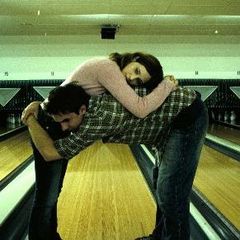
Political movies are tricky. If they take a stand too quickly and too strongly, they can come off as preachy. Now being preachy is not necessarily a bad thing. It has its place at public meetings, news shows, debates, editorials, and the like. However, bonkinbg someone over the head with a message in a movie is rough. Leaving no room for interpretation is a bad way to construct a film. Still, taking a side should not lead to a viewer to dismiss a movie altogether, especially if that movie is intelligent and provocative in a necessary way. Rendition is just such a movie.
Rendition is a government policy that started in the Clinton administration. Basically, suspected terrorists can be shipped off to other countries and interrogated without being charged or legal counsel. It surely is a product of the times we live in, but to think that this was enacted before September 11 is an eye- opening look at the state of government actions prior to the War on Terror.
Rendition the movie follows four different story lines that intersect in a way that is popular in movies of the last few years (Babel, Crash, etc.). One story follows Anwar El-Ibrahimi (Omar Metwally) a Egyptian family man who has lived in the U.S. for the past twenty years, graduated from an American university, married an American woman (Reese Witherspoon), had a son, and worked as a chemical engineer for many years. He is apprehended on his way home from a conference in North Africa by the U.S. government on suspicions of terrorists activities, flown out of the country, and questioned by Abasi Fawal (Yigal Naor) in a interrogation observed by Douglas Freeman (Jake Gyllenhaal), a U.S. government employee who is promoted after his colleague is killed in a suicide bombing.
The other story follows Fawal's daughter Fatima as she rebels against her father's attempts to marry her off to someone she does not love. She runs away and flees to the arms of her secret boyfriend Khalid (Moa Khouas).
Back in the States, Anwar's wife Isabella (Witherspoon) worries when her husband does not come home. She heads to Washington to seek the help of her old college friend Alan Smith (Peter Sarsgaard) who works for a Senator Hawkins (Alan Arkin). It is from Smith that Isabella and the audience learn (a little too quickly) the meaning of rendition. She works to learn what has happened to her husband and why he was taken away.
Another Senator, Corrine Whitman (Meryl Streep), is in charge of the committee that orders rendition. Whether or not she is right in her thinking, she is definitely shown as the film's villain.
The story revolves around the interrogation/torture in the other country, and Gyllenhaal's character provides the eyes through which we see the atrocities. The film's handling of the torture scenes should be commended. Unlike the recent slew of horror films forcing torture into entertainment, there is no torture glorified or glamorized in Rendition. Whether you agree with torture or not, it is displayed with all its violence and pain. Still, it could have been a lot worse to watch. Even though it was tough to take in, we are not presented with horrible blood splatters or close ups that over-accentuate the acts.
Gyllenhaal's character starts out in the movie much like I did. He was aware of the act of torture and saw it as a unfortunate way to receive life-saving information. He knew what was involved, but until he was forced to see it first hand, he was able to turn away and sleep well at night. When he does come face to face with torture, he is not able to ignore it. When you have to think about it, it hurts.
There is a scene that takes place after several days of torture. Gyllenhaal's character has not handled his observation well. He asks to be left alone with Anwar. He starts out asking for answers. Then he snaps and grabs Anwar forceably by the throat and demands answers. It is a harsh scene, but after thinking about it, I understood what was really happening. Freeman (Gyllenhaal) was begging for an answer because he could not stand the torture any longer. He wanted to go home. He wanted to try to forget. Eventually, he found out he could not forget or ignore what was happening any longer.
The film doesn't really allow for any amazing feats of acting. No one is given juicy scenes to show off or play extreme depth or internalization of their characters. That is okay. Everyone does deliver solid performances. A solid performance by any one member of the amazing cast is better than a amazing performance by any number of performers. No goes above and beyond because no one has to. I hope that director Gavin Hood stretches his casts more in future movies.
The multiple story lines are also not handled as well as they could be. Each are shown with equal importance for two thirds of the movie, but Anwar and Freeman's storyline as well Fatima and Khalid's storyline move into more screen time and the foreground of the film in the last third. The Washington storyline moves into the background and dismisses a key character when it chooses much before it should have.
I was not interested in the Fatima and Khalid storyline for most of the movie before its relevance was made clear in the last act. I would have appreciated a more involving handling earlier on by the writer and director.
I did really like this movie. The connection of all the story lines is solidified in the end and satisfies in a way I was not prepared for by the average first two acts. I think I appreciated the movie as a great conversation starter that made me more aware (albeit in a fictionalized/stylized manner) of problems I was not aware of. It is an interesting film in the way that it evokes a reaction, but does not offer any answers that would help the audience in their next steps. That is part of the reason this politically-minded film avoids the preachiness that derails so many other films.
***1/2























